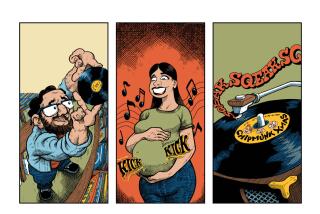Holding Technology Hostage
- Share via
As most owners of compact disc players will testify, digital recording technology has brought a new dimension of clarity and sound to the home stereo system. Virtually everyone who hears a compact disc for the first time is struck by the amazing fidelity of the sound, compared with familiar LP records or cassette tapes.
Now Japanese engineers and manufacturers have developed the next stage in the unending march of technology: digital audio tape, which produces the same perfect sound that compact discs do but can be used for recording as well. Compact discs can only be played back. They cannot be recorded over. Digital audio tape, like conventional tape, can record as well as play back. It bears the same relation to compact discs that regular tape bears to phonograph records.
But there’s a rub. The music-recording industry fears that putting improved taping machines in consumers’ hands will result in more taping and fewer sales. The industry is leaning on the manufacturers not to bring digital audio tape to market unless the machines are equipped with devices that prevent copying. The manufacturers--interested in their own sales figures--are not inclined to do that, so the record industry is now trying to get the United States to place very high tariffs on digital audio tape machines that do not have the spoilers.
Although the technology is new, the issue of private copying of copyrighted material is not.In a similar case involving video taping, the U.S. Supreme Court correctly held a few years ago that home taping for private use is legal and that consumers have a right to make electronic copies even though doing so deprives recording companies of additional sales.
That still seems like the right answer to a difficult question. As a practical matter, determined consumers will figure out a way to defeat spoilers on digital recording machines anyway, so putting them on is little more than a nuisance that will slow people down. Moreover, consumers should be able to make copies of compact discs that they own for their own use. The recording industry could still put digital signatures into their products that would enable them to identify pirated tapes sold commercially in violation of the copyright laws.
As anyone who has ever used a Xerox machine knows, copying existing material is an effective and valuable activity, and the demand for it is not likely to go away either for printed words or for recorded sounds. Like the Luddites of old, the record companies will not be able to hold back this technology and keep it from coming to market. The recording industry should develop ways to stop the unauthorized commercial sale of its products without denying consumers the benefits that new machinery can bring them.


